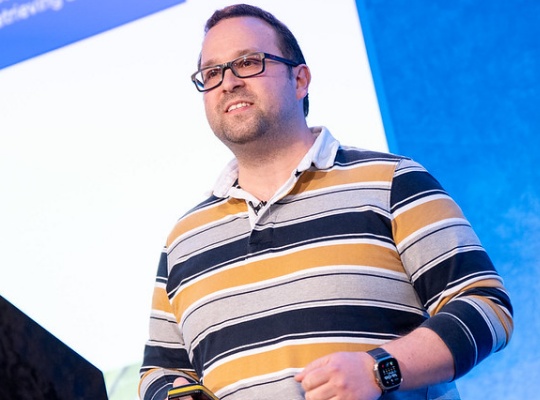Codetown
Codetown ::: a software developer's community
I was chatting with Henry Story, creator of Babelfish, the translation engine, just after he presented his current work at the Social Web Barcamp conference in Paris, France. He directed me to his talk about the state of the Semantic Web, http://blogs.sun.com/bblfish/entry/camping_and_hacking_at_har2009 and suggested I view the video online of his talk using Firefox 3.5. The one I am referring to is the first of the 4 on his blog post. What's interesting is that you don't even see these .ogg format videos using another browser than Firefox 3.5, for example Camino on the Mac doesn't render these videos visible at all!
As an aside, Henry points out the Barcamp guidelines, which we'll follow at the upcoming OrlandoJUG meeting Thursday:
* Everybody is a participant
* You make the event
* Feel free to move between sessions if you feel you are not getting what you were looking for at one of them
* Write up your interests on the black board, this will be used to create the time table.
So the sessions were put together on the spot there and then. That seems "hard" but in my experience it's always a great time, and so much better than the norm.
His mention of Metcalfe's Law was an interesting sidenote. He discussed with me the idea of using FOAF + SSL as a single point of entry and signup for a social network. I'm just beginning to understand what he's talking about, and it's phenomenal! Have any of you explored the possibilities of the Friend of a Friend project and possibly used it on a website? Let's discuss...
Tags:
Replies to This Discussion
-
Permalink Reply by Carol McDonald on September 23, 2009 at 11:03am
-
using metadata about users on the web has been in discussion for ~ 10 yrs. FOAF is interesting but I think whoever gets the most users will get the most developers, like the Facebook api or googles open social.
http://www.softwaredeveloper.com/features/welcome-to-opensocial-040... -
-
Permalink Reply by Carol McDonald on September 25, 2009 at 11:53am
-
I worked for years on implementing OSI's protocols for X.400 email , X.500 directory, CMIP network managment. X.400 was eventually replaced by SMTP not because SMTP was a better protocol , but because more people were using it. What I learned about standards... the ones that succeed are the ones that have the widest implementation and use.
-
-
Permalink Reply by Carol McDonald on September 25, 2009 at 11:54am
-
ADA is another example, remember that
-
-
Permalink Reply by Michael Levin on September 25, 2009 at 12:09pm
-
What's ADA, Carol?
Carol McDonald said:ADA is another example, remember that -
Notes
Welcome to Codetown!
 Codetown is a social network. It's got blogs, forums, groups, personal pages and more! You might think of Codetown as a funky camper van with lots of compartments for your stuff and a great multimedia system, too! Best of all, Codetown has room for all of your friends.
Codetown is a social network. It's got blogs, forums, groups, personal pages and more! You might think of Codetown as a funky camper van with lots of compartments for your stuff and a great multimedia system, too! Best of all, Codetown has room for all of your friends.
Created by Michael Levin Dec 18, 2008 at 6:56pm. Last updated by Michael Levin May 4, 2018.
Looking for Jobs or Staff?
Check out the Codetown Jobs group.
InfoQ Reading List
Argo CD 3.3 Brings Safer GitOps Deletions and Smoother Day‑to‑Day Operations

The application deployment and lifecycle management tool Argo CD has reached a new milestone with the release of version 3.3, extending the capabilities of the popular GitOps continuous delivery tool while addressing several long-standing pain points for operators.
By Matt SaundersMySQL 9.6 Changes Foreign Key Constraints and Cascade Handling

MySQL is changing the way foreign key constraints and cascades are managed. Starting with MySQL 9.6, foreign key validation and cascade actions are handled by the SQL layer rather than the InnoDB storage engine. This will improve change tracking, replication accuracy, and data consistency, making MySQL more reliable for CDC pipelines, mixed-database environments, and analytics workloads.
By Renato LosioVercel Releases React Best Practices Skill with 40+ Performance Rules for AI Agents

Vercel has launched "react-best-practices," an open-source repository featuring 40+ performance optimization rules for React and Next.js apps. Tailored for AI coding agents yet valuable for developers, it categorizes rules based on impact, assisting in enhancing performance, bundle size, and architectural decisions.
By Daniel CurtisKubernetes Introduces Node Readiness Controller to Improve Pod Scheduling Reliability

The Kubernetes project recently announced a new core controller called the Node Readiness Controller, designed to enhance scheduling reliability and cluster health by making the API server’s view of node readiness more accurate.
By Craig RisiPresentation: Platforms for Secure API Connectivity With Architecture as Code

Jim Gough discusses the transition from accidental architect to API program leader, explaining how to manage the complexity of secure API connectivity. He shares the Common Architecture Language Model (CALM), a framework designed to bridge the developer-security gap. By leveraging architecture patterns, engineering leaders can move from six-month review cycles to two-hour automated deployments.
By Jim Gough
© 2026 Created by Michael Levin.
Powered by
![]()